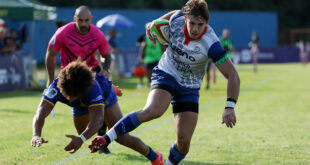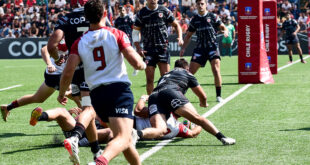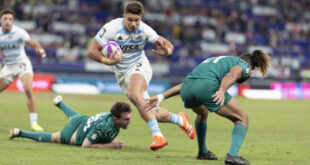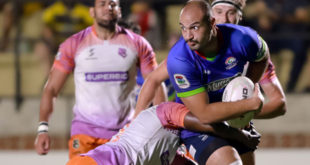Daniel Hourcade’s naming of his squad of 31 players for the upcoming Rugby World Cup was genuinely well accepted. Questions were raised over certain selections, most notably being the decision to take only two hookers but three inside centers.
Little though was spoken about in relation to a widely unknown phenomena, that of transformation. No, I am not referring to a policy related to race relations but, rather, the quest of the Unión Argentina de Rugby (Argentine Rugby Union – UAR) to expand rugby nationwide and end the historic domination which Buenos Aires has held.
Home Internationals
The capital of Argentina is easily the largest city in the country and is more so than what Sydney is to Australia, New York to the USA or Shanghai to China. Unlike these cities and countries Buenos Aires has no domestic rival in terms of size or market potential. Moreover the Greater Metropolitan area is home to 13 million, a comparable number to the likes of London, Los Angeles and Paris.
The country nonetheless has other large cities with Córdoba and Rosario both having populations of over 1 million and Mendoza, Tucumán and La Plata all coming very close. But with the UAR seeking to market the Los Pumas brand Buenos Aires no longer holds the lion’s share of home internationals.
The city, instead, has tended to host one test match each year but not always. Since the open policy of relocating home internationals to the provinces began in 2008 Buenos Aires has hosted four test matches, all of which were played at Velez Sarsfeld Stadium.
Just under an hour away from Velez Sarsfeld is the Estadio Unico in La Plata which hosted New Zealand in 2012, 2013 and 2014. It was supported by Rosario, Mendoza and Salta which played host to Australia and South Africa during the same period while Córdoba, San Juan, Resistencia and Tucumán were used for incoming June internationals.
PladAR
The transformation is also evident in the High Performance program. Shortened to PladAR the program has been identifying and training young players across the country in regional centers. Buenos Aires was joined by Mendoza in the west, Córdoba in the center, Tucumán in the north and Rosario in Entre Rios and the intention is to expand.
The establishment not only succeeded in having a larger base of players prepared for representative duty but it also diminished the veto power that the Buenos Aires union had long held. The rivalry between the capital and the remainder of the country had complicated decision making and held back the sport.
PladAR has changed this but the progress achieved is just the beginning. The inland was in support of professionalism while Buenos Aires was opposed. The prime reason for this was that Buenos Aires clubs fear for their survival and want the URBA Top 14 to remain as important as it is today and has been over the years.
This has meant PladAR players have been blocked from playing for their URBA clubs even though though from PladAR centers other than Buenos Aires have been free to play for their clubs in other competitions.
Roster
Hourcade is the first Head Coach from Tucumán, a rugby stronghold. The city has produced notable Pumas over the years but has been unable to live up to the great potential it undoubtedly possesses due to the domestic structure. PladAR, though, is changes this.
Of Argentina’s Bronze Medalist squad from 2007 only Omar Hasan, Juan Manuel Leguizamón, Martin Schusterman and Federico Todeschini were not from Buenos Aires. The number increased to eleven in 2011 with Leguizamón returning and being joined by Maximiliano Bustos, Manuel Carizza, Genaro Fessia, Juan Figallo, Martín Rodríguez Gurruchaga, Juan Imhoff, Nicolás Sánchez, Leonardo Senatore, Tomás Vallejos Cinalli and Nicolás Vergallo.
For this year’s World Cup the number is slightly down to nine out of 31 players. Those from outside of Buenos Aires in the squad are the returning Imhoff, Leguizamón and Senatore in addition to Matías Alemanno, Jerónimo de la Fuente, Matías Díaz, Ramiro Herrera, Facundo Isa, Lucas Noguera Paz and Javier Ortega Desio.
Curiously of the five players left out of the squad only Gonzalo Camacho is from Buenos Aires. Santiago Iglesias Valdez had been expected to be one of three hookers and Carizza, Tomás Lezana and Benjamín Macome all performed well in the Rugby Championship but missed out. Also absent will be Juan Pablo Orlandi of Mendoza who had made a surprise return.
Another player missing out is Patricio Fernández who is all-time top scorer at the World Rugby Under 20 Championship. Hourcade opted against the Rosario fly half in 2014 on the grounds that he was considered not ready. In his place Santiago González Iglesias and Juan Pablo Socino are to play in the World Cup.
Fernández’s time, though, will come and those to have followed on from him for Los Pumitas are also from outside of Buenos Aires. Both Emiliano Boffelli and Domingo Miotti have international futures and their names,m together with Fernández’s could well be in Argentina’s 2019 squad.
Injuries
Injuries also played their part with Figallo and Bustos having been the top two loosehead props under Phelan. Before their serious spinal injuries both had been among the leading players in the positions anywhere.
Another casualty is Manuel Montero whose injury has enabled Horacio Agulla to be selected for a third World Cup. Both, though are from Buenos Aires clubs and therefore the overall representation was not going to be much different to that of 2011. Not withstanding in terms of the big picture the longevity of rugby in Argentina is secure and Los Pumas will not return to having only four World Cup players from outside of Buenos Aires.
 Americas Rugby News Rugby news from across the Americas!
Americas Rugby News Rugby news from across the Americas!




